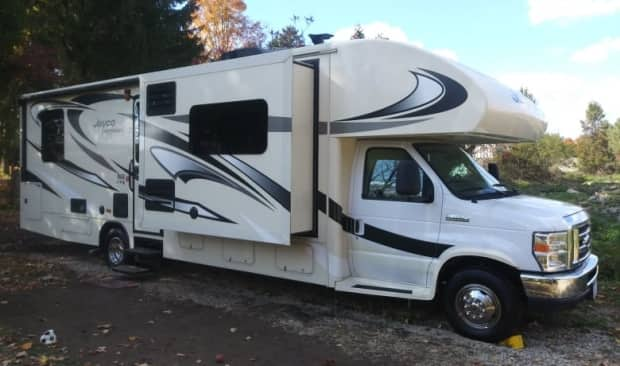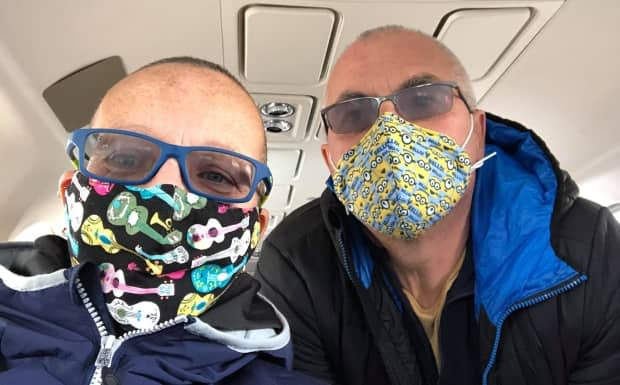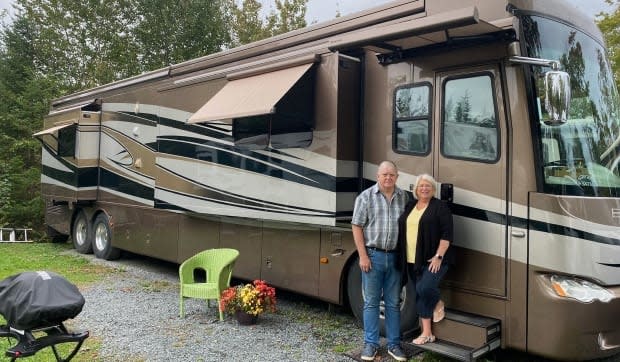Canadian snowbirds question why land border is still closed as they prepare to fly to U.S., ship their RVs

As the United States land border closure to non-essential travel drags on, patience is wearing thin for some fully vaccinated Canadian snowbirds who live in their RVs year-round.
That's because if the U.S. side of the border remains closed next month, the snowbirds will be shelling out big bucks to fly to the U.S. and transport their RVs by land.
"It's ridiculous," said Laura Fordham who lives in an RV full-time with her husband, Fred. "It just does not make sense why they would let people fly, but not let people drive."
The couple's current home-base, an RV park in Puslinch, Ont., near Guelph, closes at the end of the month.
The U.S has extended its land border closure until at least Oct. 21. If that date is extended into November, Fordham said the couple will pay a commercial driver around $700 to transport their RV across the Michigan land border. Although Canadian travellers currently can't cross by land, there are no restrictions on them importing vehicles to the U.S.

Fordham said she and her husband will also have to pay hundreds of dollars each to fly from Toronto to Flint, Mich., so they can pick up their RV and drive it to Texas.
"It hurts the pocketbook," she said about the potential added costs. "We're only on a government pension; we don't have any extra money."
Like other snowbirds CBC News has spoken to, Fordham questions the logic behind the current U.S. travel rules where Canadian travellers can fly to the U.S., but not drive. She argues travelling in an RV is a safer way to cross the border than flying during a pandemic.
"If we have our motor home, we're just the two of us," she said. "You're not in crowds."
Some travel restrictions eased
At the start of the pandemic in March 2020, the U.S. and Canada agreed to close their shared land border to non-essential travel. For reasons that have never been explained, the U.S. still allowed Canadian leisure travellers to fly to the country.
In August, Canada reopened its land and air borders to fully vaccinated American travellers.
In September, the U.S. announced it too will loosen some travel restrictions.
Since the start of the pandemic, the U.S. has barred air passengers from dozens of countries, including most nations in Europe. Last week, the U.S. government said it will lift that ban in early November and require foreign arrivals by air to be fully vaccinated.
But on the topic of the land border, the government only said that it remains closed due to the pandemic and that as of yet, there's no set reopening date.
"We don't have any updates or predictions at this point in time," White House press secretary Jen Psaki told reporters last week.

According to the Canadian Snowbird Association, in a typical year, more than one million snowbirds make the trek down south, and most travel in their vehicles.
If the land border closure continues, a number of snowbirds will likely stay home. But that option poses challenges for those who would have to spend the Canadian winter in their RV or secure a temporary home.
"They should open the land border to Canadians that are fully vaccinated," said Bernard Loiselle.
He and his wife, Sylvie Charbonneau, are currently living in an RV park in Marieville, Que., just outside Montreal, which closes near the end of the month.
The couple has already signed up with a Quebec company that will fly them on a chartered plane to Plattsburgh, N.Y., on Nov. 1. The company will also transport their RV across the land border, so Loiselle and Charbonneau can pick it up in Plattsburgh and drive to Florida.
If the U.S. land border reopens on Oct. 22, the couple will cancel their plans. If not, the total price tag just to cross the border will be more than $2,000.
"We have to do what we have to do to spend the winter in the sun," said Loiselle.
WATCH | Tears, joy as Canada reopens border for vaccinated Americans:
What's the rationale?
Priscilla Crowther of Hammonds Plains, N.S., near Halifax, is poised to book a similar transport service should the U.S. border closure extend into November. Crowther and her husband, Gary not only live in their RV year-round, but also pay about $800 Cdn a month to secure a spot for their home at an RV park in Florida.
Crowther said she would like to hear an explanation from the U.S. government why the couple pose a danger if they drive to the U.S. instead of fly.
"It's a question that we've been asking ourselves, shaking our heads about," she said. "I would love to know what the rationale behind it is."

CBC News has repeatedly asked the U.S. government why Canadians can fly but not drive to the U.S. during the pandemic. The government has never responded.
Last week at a government committee hearing, U.S. Senator Gary Peters of Michigan inquired about the rationale for keeping the land border closed to fully vaccinated Canadians.
"The arc of the delta variant is not yet where we need it to be," responded Department of Homeland Security Secretary Alejandro Mayorkas.
He said U.S. travel restrictions were being eased in stages and did not provide a timeline for reopening the land border.
"We are looking at the situation," said Mayorkas.
That leaves some snowbirds waiting in the wings to find out if their annual trek down south will be a routine trip, or involve a more costly and complicated journey.
"There's really nothing we can do about it," said Loiselle.

